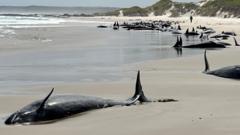In a heartbreaking decision amid challenging conditions, Australian authorities have announced the euthanasia of approximately 90 false killer whales that survived a mass stranding on a remote beach in Tasmania. This event occurred near Arthur River, where a total of 157 whales beached themselves. Unfortunately, most of the pod perished shortly after the incident.
The situation has become dire for the whales, which biologists note are suffering extreme stress after being stranded for 24 to 48 hours. In a statement, local resident Jocelyn Flint expressed her anguish upon witnessing the stranded animals who appeared to seek help.
Experts on-site described the location as one of the most challenging they’ve encountered in recent years, making rescue operations complex. Marine biologist Kris Carlyon highlighted the tough terrains and limited access, stating, “This is possibly the trickiest location I've seen in 16 years.” Attempts to refloat two whales were unsuccessful as the animals struggled against the ocean waves, prompting wildlife veterinarians to contemplate euthanasia as the last resort to alleviate their suffering.
The euthanasia process, involving shooting the animals, is planned to start this Wednesday and extend into Thursday. Additionally, authorities are deliberating on the proper disposal of the carcasses, considering the cultural significance of the site for Aboriginal communities.
Mass strandings are not uncommon in Tasmania, indicating a troubling trend; previous incidents included a record 470 pilot whales stranded in 2020, with many succumbing despite rescue attempts. Experts speculate a variety of reasons for these beachings, ranging from disorientation to group behaviors caused by reliance on communication within tightly-knit migratory pods.
Given the precarious situation, officials have urged the public to steer clear of the area, stressing both safety from adjacent bushfires and the emotional toll of witnessing the stranded marine mammals. The situation underscores the vulnerability of social creatures like whales, a stark reminder of nature's unpredictability and the urgent need for understanding their complex behaviors in conservation efforts.
The situation has become dire for the whales, which biologists note are suffering extreme stress after being stranded for 24 to 48 hours. In a statement, local resident Jocelyn Flint expressed her anguish upon witnessing the stranded animals who appeared to seek help.
Experts on-site described the location as one of the most challenging they’ve encountered in recent years, making rescue operations complex. Marine biologist Kris Carlyon highlighted the tough terrains and limited access, stating, “This is possibly the trickiest location I've seen in 16 years.” Attempts to refloat two whales were unsuccessful as the animals struggled against the ocean waves, prompting wildlife veterinarians to contemplate euthanasia as the last resort to alleviate their suffering.
The euthanasia process, involving shooting the animals, is planned to start this Wednesday and extend into Thursday. Additionally, authorities are deliberating on the proper disposal of the carcasses, considering the cultural significance of the site for Aboriginal communities.
Mass strandings are not uncommon in Tasmania, indicating a troubling trend; previous incidents included a record 470 pilot whales stranded in 2020, with many succumbing despite rescue attempts. Experts speculate a variety of reasons for these beachings, ranging from disorientation to group behaviors caused by reliance on communication within tightly-knit migratory pods.
Given the precarious situation, officials have urged the public to steer clear of the area, stressing both safety from adjacent bushfires and the emotional toll of witnessing the stranded marine mammals. The situation underscores the vulnerability of social creatures like whales, a stark reminder of nature's unpredictability and the urgent need for understanding their complex behaviors in conservation efforts.



















